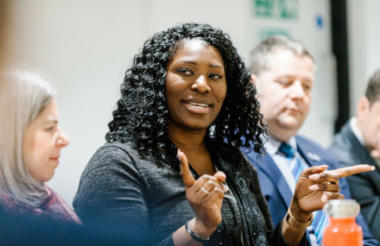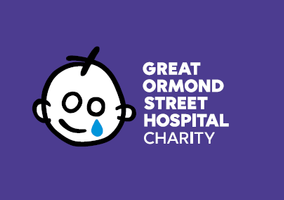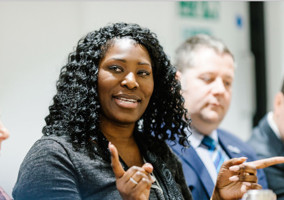Charity leaders should create a “narrative of hope” as part of their work with vulnerable people, according to Ndidi Okezie, the chief executive of UK Youth.
Ozekie was speaking online last Friday, on the final day of the Charity Finance Group conference.
Speaking on the same panel, NCVO boss Karl Wilding warned that funders would not be able to fill the financial gap in the sector created by the pandemic, and said that charities will need to explore “different operating models” as part of future plans.
An end to doom-and-gloom
Ozekie told the event that the young people helped by her charity “are listening to everything that is said about them in the media, and even by us as those advocating on their behalf.
“We have to be careful that we are not purely speaking negative doom-and-gloom.
“Just as it is important to clarify the issues and the challenge, we have to hold on to a narrative of hope, and [make it clear] that there has to be solutions and opportunities for young people.
“One of the things that really struck me was that earlier on in the year we started this ‘lost generation’ chat. That really bugged me because they have not gone anywhere.”
Hope is hard
Answering questions from the digital audience, Ozekie said: “It is really hard, sometimes, to sound hopeful when you feel battered, and there’s an onslaught of things barraging down on you.”
She agreed that “you have to highlight the need” that charities are there to serve, but added: “Change cannot be made without hope.
“People often dismiss hope as this airy-fairy namby-pamby cute, overly-optimistic thing. I am not talking about ignorant hope or naïve hope, or hope that ignores problems.
“But you cannot solve things without a belief that they can be solved. And that is hope.”
Ozekie also called for leaders to show a “non-stop, can-do attitude” in communicating their values.
Caron Bradshow, the chief executive of CFG, agreed that charities have sometimes struggled with telling positive stories during the crisis.
Bradshaw said that “the narrative we have had in the sector as a whole” had too often involved “being there holding the begging cup, or that we are a passive recipient, all the negative connotations”.
“Even the chancellor described us as gentle, but the reality of charities is very different,” she added.
'We should get out there and shout and scream about what we do'
Bradshaw said later that charities “need to be less queasy about talking about the role” they fulfil in society.
She said: “You can’t talk about breathing without talking about the role of lungs. You can’t talk about social change without the role of social change organisations.”
Bradshaw added: “We should get out there and shout and scream about what we do. Because we won’t have the opportunity once it is gone.”
‘Rationalisation and doing things differently’
Karl Wilding told the event that the impact of Covid-19 on the sector was “here to stay”, and that charities could not rely on foundations to make up the money lost during the coronavirus crisis.
He said it was time for “an acknowledgement, perhaps on our part, that funders on their own are not going to be able to do this in terms of the future [finance] gap, and some of it is going to be about what responsibility we take for ourselves, about how we come up with different operating models and different financial models for the future.
“And, at the risk of making myself unpopular, some of that is going to be about rationalisation on our part and doing things differently.”
Related articles












